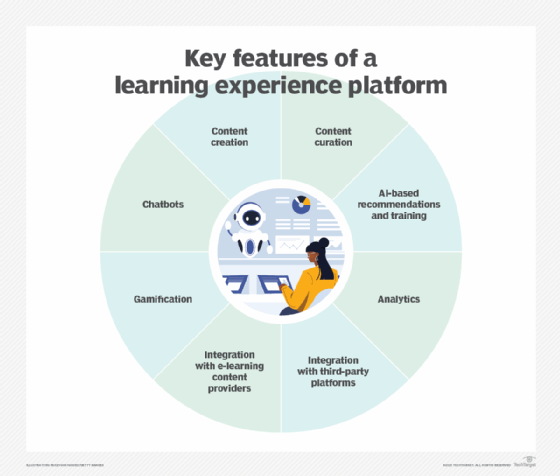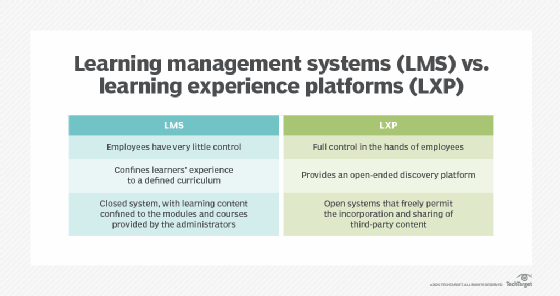learning experience platform (LXP)
What is a learning experience platform (LXP)?
A learning experience platform (LXP) is an artificial intelligence (AI) driven peer learning platform delivered using software as a service. LXPs were born out of a new approach to corporate learning platforms, addressing perceived shortcomings with learning management systems (LMS).
While a learning management system focuses on the needs of the learning & development (L&D) department to deliver education, policy and compliance training to employees, an LXP flips the model to focus on employees' needs.
An LXP is an intuitive learning and development platform. LXPs help employees answer key business questions and provide them with opportunities for professional development. Learning experience platforms signal a shift away from the top-down, management-administered style of LMSes and toward a more bottom-up, autonomous and self-directed style of learning.
Industry analyst Josh Bersin coined the term learning experience platform. While the user experience of conventional corporate learning platforms might be perceived as outdated or stale, LXPs deliver a modern, consumer-grade look and feel much like the experience of popular social networking and multimedia sites. LXPs also provide fully functional mobile device experiences, delivered through responsive design and mobile apps.
LXPs support an array of content, sourced from inside and outside a company's firewall. Content types in an LXP can include blog posts, industry articles, videos, podcasts and courses. LXPs enable end users to create and publish content, along with social media-style profiles that include user bios, achievements and activities.

What are LXPs used for?
LXPs are used to satisfy the self-directed learning needs of employees seeking skills development and professional development. While an LMS is well-suited as compliance training software, it falls short for open-ended discovery and goal-based learning. For example, employees might state, "We want to learn more about Java programming," but discover that no entries in the LMS course catalog suit their needs.
An LXP uses AI to recommend content to users, including third-party blog posts, articles, documents and videos available on the internet. The use of AI enables personalized employee learning based on users' past activities, stated goals and inferred learning styles. An LXP supports peer-based social learning as well, connecting users with peers and experts in a manner similar to social networking platforms.
Key features
The following are key features of a learning experience platform.
- Content creation. An LXP supports user-generated content from end users. Employees can use a WYSIWYG (what you see is what you get) editor to create posts and lessons, which can include hyperlinks, images, videos and documents. LXP users can leave ratings and comments on the posts and lessons.
- Content curation. LXPs provide machine learning services to intelligently select and organize third-party content discovered on the web and provide relevant content tailored to users' needs. In addition, users can manually curate both internal and third-party content to share with peers.
- AI-based recommendations and training. Some LXPs can ingest training content, such as documents and videos, and apply AI and machine learning to determine what the material is teaching. AI can then generate microlearning, training programs and recommendations. Some LXPs understand the instructional needs of a user and fast-forward to the specific point in a video where the learner should begin watching.
- Analytics. LXPs collect and store use and learning data to display in dashboards and reports that both end users and administrators use. The dashboards help employees track their progress toward goals and help administrators understand learning and usage trends across the platform.
- Chatbots. Some LXPs provide AI-based chatbots that are available to users 24/7. The chatbots assist users with their tasks and make intelligent recommendations. Users interact with chatbots by typing messages in text-based chat areas.
- Gamification. LXPs use gamification, or gaming mechanics -- such as leaderboards, badges, achievements and special privileges -- to spur engagement and competition.
- Integration with e-learning content providers. LXPs integrate with free and paid e-learning providers, giving users access to course materials from platforms such as Coursera, LinkedIn Learning and Udacity.
- Integration with third-party platforms. Application programming interface integration lets an organization use an LXP to connect with third-party business applications, such as communications, cloud storage, document management, customer relationship management and enterprise resource planning apps.
LXP benefits
Modern LXPs offer a few key benefits that lead to increased flexibility. They include the following:
- Tailored and customized learning paths. An LXP uses machine learning and AI to guide employees' learning paths using personalized recommendations. Personalized learning enables employees to get more out of the platform, with content and interactions geared toward their learning goals. In addition, LXPs give administrators the option of manually configuring training recommendations offered to users.
- Agile learning. Traditional learning requires an upfront planning process where employees must set aside an hour or more of time to view an online course. These days, allocating a few hours out of a day's schedule might not be feasible. Employees would much rather have agile learning experiences that deliver content quickly and flexibly in the flow of work to better suit their busy schedules. LXPs deliver microlearning content that answers a need at a particular moment in time.
Difference between LXP and LMS
In an LMS, the administrators determine course sequences and learning paths, giving employees little control over the content they consume and the activities they participate in. An LXP democratizes the learning experience, putting full control in the hands of end users.
With an LXP, employees can set their own goals and determine their own learning paths. While an LMS confines learners' experiences to a defined curriculum, an LXP's functionality provides an open-ended discovery platform that can take employees in any direction they choose.
An LMS is a closed system, with learning content confined to the modules and courses the administrators provide. LMSes don't incorporate resources from third-party providers, nor do they permit end users to create content.
LXPs, on the other hand, are open systems that freely permit the incorporation and sharing of third-party learning tools and learning resources. In addition, LXPs enable users to curate and add content for discovery by other users. With an LXP initiative, end users can elevate their profile and reputation with the knowledge and information they share.

Future of LXP
LXPs' popularity has continued to increase in recent years. The rise of remote work since the COVID-19 pandemic has led to LXPs and LMSes becoming even more widely adopted.
Experts predict the L&D market in general will continue to grow, especially with AI-powered tools -- particularly generative AI -- changing the landscape and making it more efficient. Forty-two percent of 182 learning system providers surveyed in 2023 were moderately to heavily experimenting with generative AI and large language models, according to RedThread, a learning technology market research firm. In addition, a new emphasis on the creator economy is also putting the LXP market in the spotlight.
LXPs and LMSes are a key part of an overall HR system. Learn how to choose the right HR software in our buying guide.






